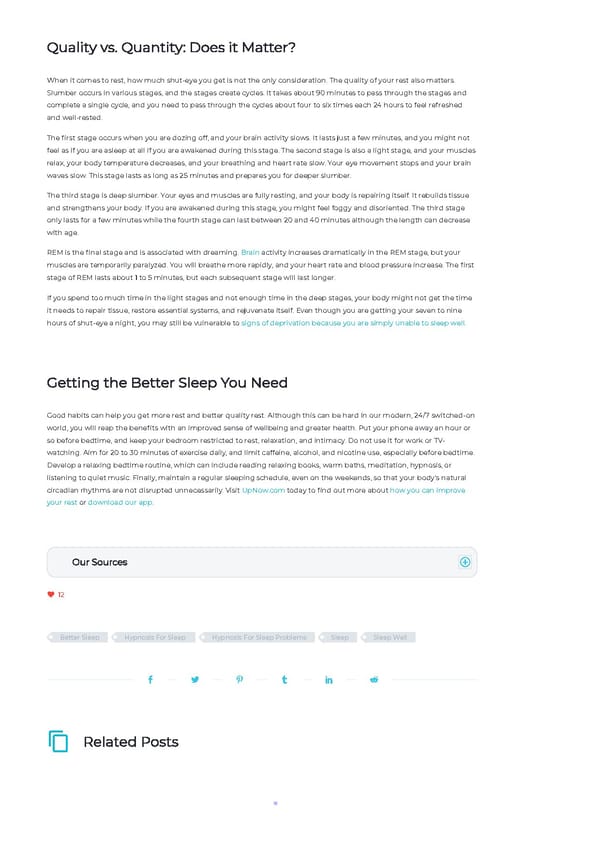Quality vs. Quantity: Does it Matter? When it comes to rest, how much shut-eye you get is not the only consideration. The quality of your rest also matters. Slumber occurs in various stages, and the stages create cycles. It takes about 90 minutes to pass through the stages and complete a single cycle, and you need to pass through the cycles about four to six times each 24 hours to feel refreshed and well-rested. The 몭rst stage occurs when you are dozing off, and your brain activity slows. It lasts just a few minutes, and you might not feel as if you are asleep at all if you are awakened during this stage. The second stage is also a light stage, and your muscles relax, your body temperature decreases, and your breathing and heart rate slow. Your eye movement stops and your brain waves slow. This stage lasts as long as 25 minutes and prepares you for deeper slumber. The third stage is deep slumber. Your eyes and muscles are fully resting, and your body is repairing itself. It rebuilds tissue and strengthens your body. If you are awakened during this stage, you might feel foggy and disoriented. The third stage only lasts for a few minutes while the fourth stage can last between 20 and 40 minutes although the length can decrease with age. REM is the 몭nal stage and is associated with dreaming. Brain activity increases dramatically in the REM stage, but your muscles are temporarily paralyzed. You will breathe more rapidly, and your heart rate and blood pressure increase. The 몭rst stage of REM lasts about 1 to 5 minutes, but each subsequent stage will last longer. If you spend too much time in the light stages and not enough time in the deep stages, your body might not get the time it needs to repair tissue, restore essential systems, and rejuvenate itself. Even though you are getting your seven to nine hours of shut-eye a night, you may still be vulnerable to signs of deprivation because you are simply unable to sleep well. Getting the Better Sleep You Need Good habits can help you get more rest and better quality rest. Although this can be hard in our modern, 24/7 switched-on world, you will reap the bene몭ts with an improved sense of wellbeing and greater health. Put your phone away an hour or so before bedtime, and keep your bedroom restricted to rest, relaxation, and intimacy. Do not use it for work or TV- watching. Aim for 20 to 30 minutes of exercise daily, and limit caffeine, alcohol, and nicotine use, especially before bedtime. Develop a relaxing bedtime routine, which can include reading relaxing books, warm baths, meditation, hypnosis, or listening to quiet music. Finally, maintain a regular sleeping schedule, even on the weekends, so that your body’s natural circadian rhythms are not disrupted unnecessarily. Visit UpNow.com today to 몭nd out more about how you can improve your rest or download our app. Our Sources 12 Better Sleep Hypnosis For Sleep Hypnosis For Sleep Problems Sleep Sleep Well Related Posts
 Are You Getting Enough Sleep? The Answer Might Surprise You Page 1 Page 3
Are You Getting Enough Sleep? The Answer Might Surprise You Page 1 Page 3